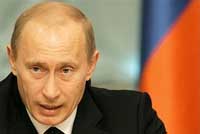Putin, Russian FM express concern about talk of potential strikes on Iran
President Vladimir Putin and his foreign minister expressed concern Monday about talk of potential strikes against Iran in a televised exchange that underscored Moscow's demand for a negotiated solution to the confrontation over Tehran's nuclear program.

They suggested that the U.S. is too trigger-happy in remarks delivered as the five permanent U.N. Security Council members met in London to discuss new ways to pressure Tehran to suspend parts of its nuclear program.
"On the one hand, the Iranian leadership has not yet given satisfactory answers to well-known questions" posed by the U.N. nuclear watchdog agency, which is trying to determine whether Iran may be seeking to develop nuclear weapons, Foreign Minister Sergey Lavrov told Putin during a Cabinet meeting.
"On the other hand, prognoses and predictions that strikes will be conducted against Iran have become more common, and this causes concern," Lavrov said, adding that U.S. Vice President Dick Cheney "allowed such a possibility in recent comments."
Cheney said last week on his trip to Australia that the United States believes "it would be a serious mistake if a nation such as Iran became a nuclear power," and reaffirmed the Bush administration's policy that "all options are on the table" to deter Tehran.
Putin, from offscreen in state television footage of the exchange during the meeting at his residence outside Moscow, asked Lavrov: "What kind of strikes are we talking about without U.N. Security Council sanctions?"
Lavrov replied that "nobody who is discussing this is referring to such sanctions," the ITAR-Tass news agency reported.
He said Russia will "do everything it can to achieve a negotiated solution."
Senior representatives of the five six nations permanent U.N. Security Council members Russia, China, the United States, Britain and France as well as Germany were likely to consider restrictions on trade and arms for Iran in a London meeting Monday to discuss new ways to pressure Tehran to suspend parts of its nuclear program.
Lavrov said participants would seek decisions "allowing for the use of all possibilities and all levers to resume negotiations," adding that it was "not an easy task," ITAR-Tass reported.
The International Atomic Energy Agency, the U.N.'s nuclear watchdog, confirmed Thursday that Iran had ignored a Security Council ultimatum to freeze enrichment a possible pathway to nuclear arms and had instead expanded its program.
In December, Russia supported a U.N. Security Council resolution imposing limited sanctions against Iran over its refusal to stop uranium enrichment, but the support came only after an initial proposal that would have imposed curbs on the nuclear power plant Russia is building in Iran was dropped.
Russia repeatedly has spoken out against turning to military action to solve the dispute over Iran's nuclear program, and has warned that overly harsh punishment would be counterproductive, reports AP.
The exchange between Lavrov and Putin, prominently featured in Russian TV news reports, came after an address earlier this month in Germany in which Putin said the United States "has overstepped its national borders in every way" and is fostering a global arms race some of his most vocal, comprehensive criticism of U.S. foreign policy.
Subscribe to Pravda.Ru Telegram channel, Facebook, RSS!


